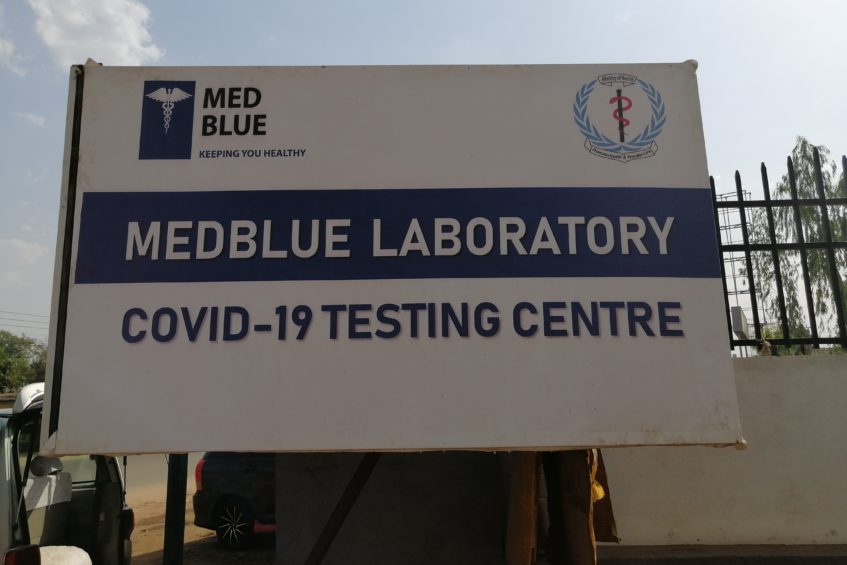
Sign post of MEDBLUE Laboratory in Juba - credit | Joakino Francis | Eye Radio | Feb 2, 2021
Private laboratories testing covid-19 are calling on the government to postpone the unified covid-19 certificate for travelers citing security threat in the new system.
Last month, the office of the Vice President Hussein Abdelbaggi and the undersecretary in the ministry of health directed all the authorized labs testing covid-19 to implement unified Covid-19 certificate for travelers as from this month.
In a statement sent to Eye Radio newsroom, the private labs say the new system comes with lots of confidentiality concerns especially for foreigners.
They stated that the new system is a security threat as it is linked to the Migration and Nationality database.
“It is not only a threat to the private labs but also to the Ministry of Health as anybody not authorized could have access to these data.”
They also say the medical data should not be shared with a third party even if its e-government as the CRF form contains questions related to an individual’s health.
The statement stated that the new system is also managed and designed by a third party which opens a room for possible monitoring on lab workflow and other data.
“Ideally, the private labs are under the Ministry of Health with the new system introduced, there is a third entity in between that have access to all medical data.”
They also mentioned the cost that comes with the new system.
“The new system comes with a high cost as it takes $6 for any foreigners coming for a test and 2,500SSP for any local coming for a test this is on top of the 20$ already being paid by all private labs.”
The private labs say the danger is not in unifying the certificate but commercialization of the process.
They also wonder who is paying 6$ and to whom.
“If the system is provided by the government then why impose the 6$ payment? All government services should be supported by the government.”
“The labs have robust systems with significant budgets invested on them currently and if anything went wrong, they take full responsibilities. With the new system introduced, who will take responsibility for whatever technical drops that might happen?” stated the statement.
The private labs say the new system is weak and vulnerable to hacking.
“The system is categorized at class B in system ranking, making it weak and prone to hacking. This is a serious issue especially as it contains all the national data.”
The labs suggested to the Ministry of Health to develop an alternative database that can be administered by the ministry.
They recommended that the country can use an international system that is secured and widely used in African countries.
“Alternatively South Sudan can use the international system used in most of the African Countries (Panabios).”
“It is a secure, standardized and tamper-proof transcontinental digital application suite for disease contagion monitoring, spatial risk factors analytics, mass testing, process traceability and outcomes tracking.”
According to private labs, the system is currently being used in Kenya, Ethiopia and the East African Community.
It is free and guaranteed and supported by the CDC, and the option favors South Sudan.
The authorized labs testing covid-19 include Medblue Laboratory, Queens Laboratory, Njoom Laboratory, P.I.C Laboratory, BioLab Laboratory, and Life Link Laboratory.
Support Eye Radio, the first independent radio broadcaster of news, information & entertainment in South Sudan.
Make a monthly or a one off contribution.
Copyright 2024. All rights reserved. Eye Radio is a product of Eye Media Limited.